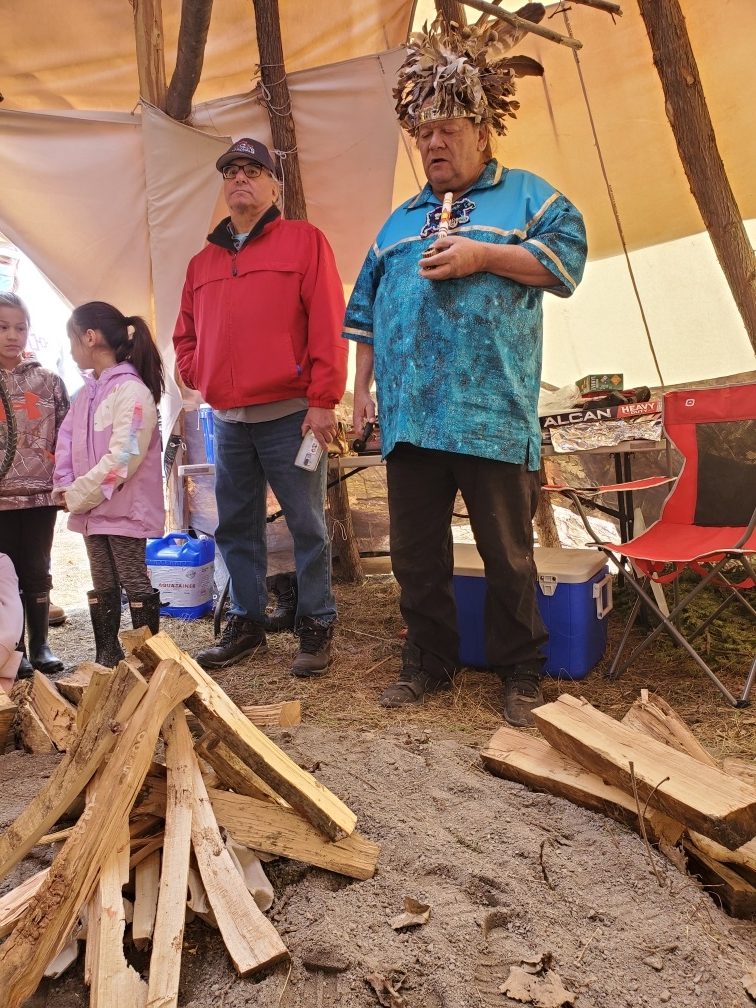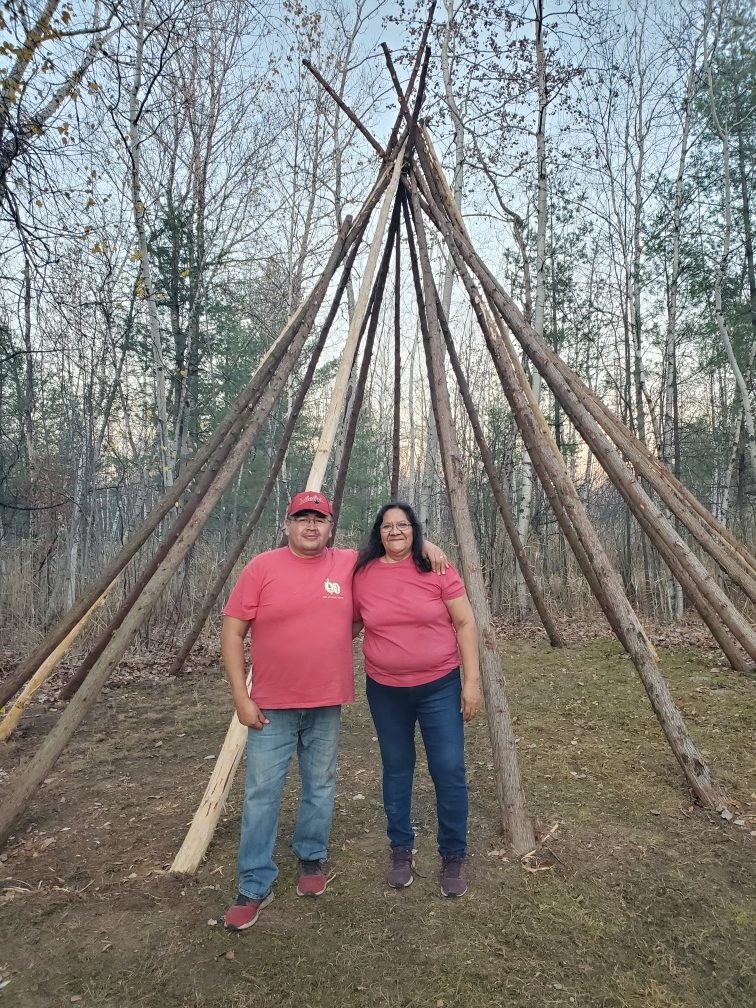Mags Brien and her mother Elizabeth cut the ribbon December 9 to celebrate the grand opening of two “modern teepees” in Kahnawake. The cross-cultural project called the Mohawk-Cree Teepee has grown rapidly since Philip Matoush and his wife Sharon Pepabano began hosting humble campfires in 2020.
“If it wasn’t for the Mohawks and the Crees doing this together, this thing wouldn’t have been possible,” Matoush told the Nation. “It’s come a long way – we started from scratch with a fire pit. Now it’s two modern teepees and we’re thinking of hooking up electricity for freezers to store all the wild meat.”
One of the permanent, hard-walled structures is named after Mags’ 14-year-old son, Elias Brien, who is originally from Mistissini but lives in Montreal to be closer to specialized medical appointments. Mags is grateful the teepees include easy access for Elias’ wheelchair and additional ventilation to alleviate his asthma.
With windows and winter insulation, these teepees simplify visits from Cree patients and escorts staying at Montreal’s Espresso Hotel for medical reasons. As a medical transport driver with Wiichihiituwin (Cree Patient Services), patients often told Matoush about they craved traditional foods roasted over the fire.
The urban bush camp began with traditional cookouts at Camping D’Aoust in Hudson, an hour west of Montreal. With the support of Cree volunteers and organizations, a teepee was built after the first summer. Since Bob Patton invited Matoush and Pepabano to relocate to his family’s beautiful property on the Mohawk reserve of Kahnawake, just a 15-minute drive from downtown Montreal, the project quickly gathered steam.
The project’s immediate popularity – with numerous volunteers regularly contributing food, supplies and labour – demonstrated the need for a healing space close to the city. In addition to funding from the Cree Health Board and Kahnawake Shakotiia’takehnhas Community Services, Charlotte Coonishish and Charles Katapatuk helped secure funds from Mistissini and Waswanipi.
“We got the funding from Mistissini and Kahnawake in one day and it just steamrolled,” said Patton. “We got people from up north who came down and built the teepees within two weeks. We had such a grand opening with 150 people we cooked for – people were amazed.”
His father, Robert Patton Sr, welcomed guests with a group prayer at the event, which featured guests such as Kahnawake Grand Chief Kahsennenhawe Sky-Deer, Mistissini Chief Michael Petawabano and CHB chairperson Bertie Wapachee.
“I’d never tried turkey dumplings before, but I finally had the chance – it’s a Mohawk dish apparently,” shared Wapachee. “It’s a great achievement for the patients who always hoped for something long-term and closer. It was like the feasts back home.”

As the teepee project expands, the CHB is helping with monthly expenses for firewood supplies, garbage collection and snow clearing. While Matoush hopes to establish weekly transportation for Espresso patients, Wapachee told the Nation there are lingering liability concerns to be worked out.
“Anything can happen between the Espresso and the teepee going back and forth,” Wapachee explained. “We have to make sure the patients are protected and the organization as well. If it can work out, it would be great for the patients.”
The teepee is becoming a hub for healing and cultural activities, including partnerships with Cree Justice and Native Para-Judicial Services of Quebec, where Patton works as a Mohawk support worker. They’re also working with federal and provincial corrections departments. Five Indigenous men already completed court-ordered community service hours by cleaning and preparing moose meat.
Patton said it’s an ideal setting for alternative dispute resolution. Interest in the site has been expressed by Narcotics Anonymous and Alcoholics Anonymous. He hopes to soon offer Gladue Report aftercare, which considers an Indigenous person’s unique family and community history in court sentencing.
“When people are released from detention, they can be part of the teepee as part of their healing journey back to the community,” explained Patton. “We’re able to provide country food to help our inmates in jail – it gives them something to look forward to. The workers themselves are quietly healing.”
While more visitors come in the warmer months, the teepee remained busy every weekend through this winter. In January, Kahnawake organizers and Waskaganish trappers came together to address a beaver overpopulation in the area, harvesting 10 beavers which were prepared by volunteers for a feast in the Mohawk longhouse.
“Bob just mentioned since we have a lot of snow now, they want to build a mountain for kids to slide down,” Matoush said. “There are lots of kids there having fun playing outside since they can’t do that in the city. They’re having a marshmallow or wiener roast at the teepee – it’s open to everybody.”
The initiative has welcomed folks from several First Nations and beyond – a Māori man from New Zealand was impressed with the goose cookout a few weeks ago. Matoush said two Inuit women who make handmade parkas are doing a photo shoot there and offered to bring some caribou meat from Nunavik.

“We’re building bridges between nations, all working together and sharing each other’s cultures and traditions,” asserted Patton. “We want to keep it political-free and grassroots. Like my grandmother always says, leave everything at the doorstep, everything comes with a good mind.”
There are plans to erect two traditional teepees, build more fire pits, install picnic tables and to landscape the property. They hope to offer overnight stays and create sweat lodges at the site.
There’s potential for making it “a home away from home” while addressing food security for Cree patients by developing community gardens, believes Patton. He suggested raising chickens and turkeys for both meat and eggs, which could then be delivered to patients or sold to subsidize teepee expenses.
“It’s all about bringing nations together, learning from each other,” said Matoush. “That’s what I dreamt about when we started. We’re making new friends every day! It’s so relaxing there – I feel like I’m back home.”





